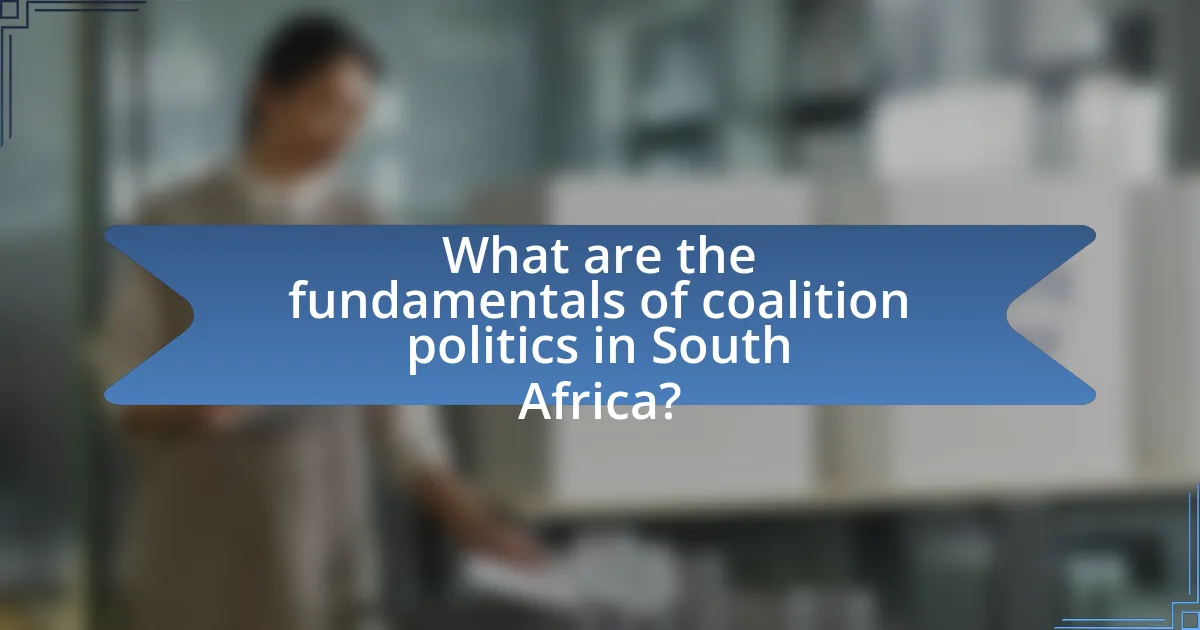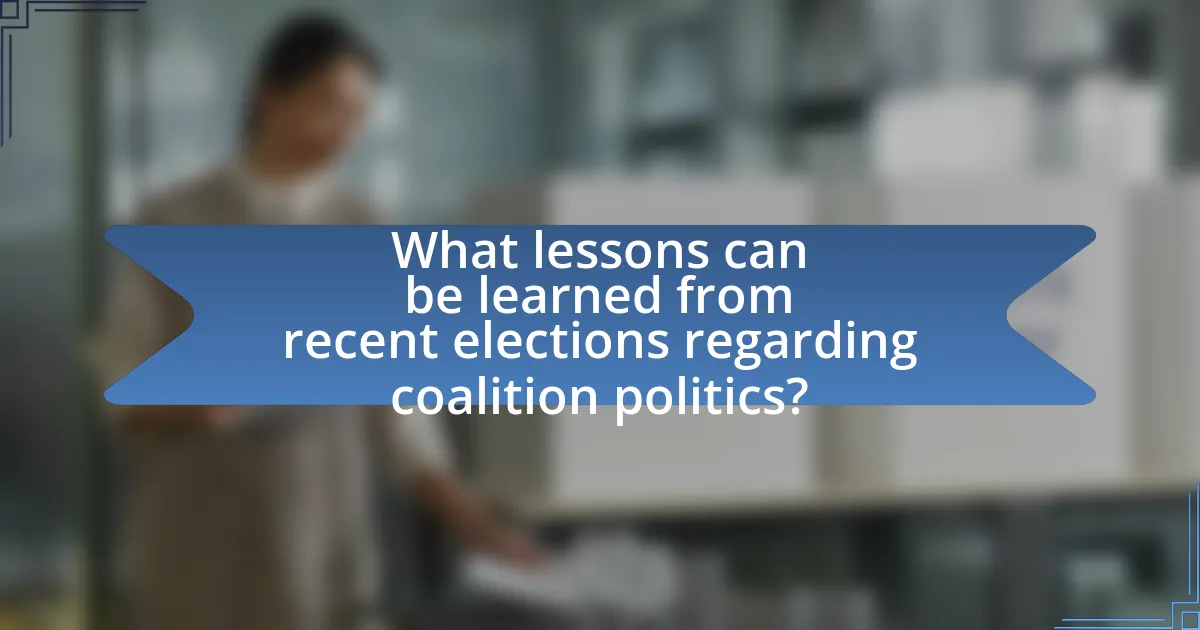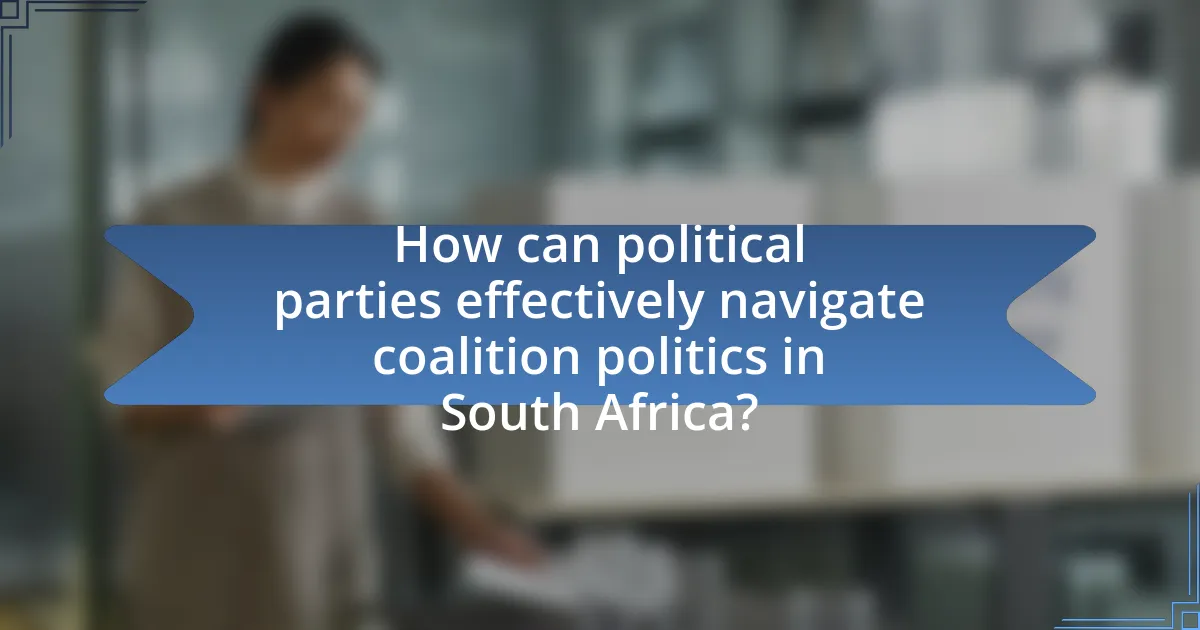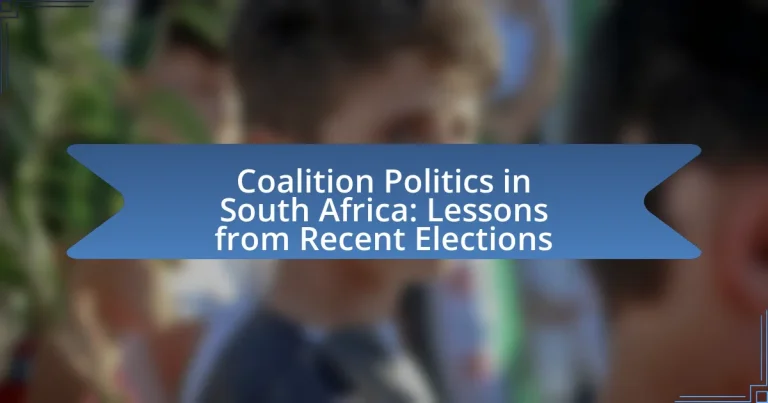The article focuses on coalition politics in South Africa, particularly in the context of recent elections. It examines the fundamentals of coalition governance, the evolution of political alliances since the end of apartheid, and the historical events that have shaped the current political landscape. Key characteristics of coalition politics, including negotiation processes, power-sharing arrangements, and the impact of voter behavior on coalition dynamics, are discussed. The article also highlights the challenges faced by coalitions, such as ideological differences and conflict resolution, while offering insights into successful strategies for collaboration and the implications of recent election results for future governance.

What are the fundamentals of coalition politics in South Africa?
The fundamentals of coalition politics in South Africa involve the necessity for political parties to collaborate in order to achieve governance, particularly in a multi-party system where no single party often secures an outright majority. This collaboration is driven by the need to form stable governments, especially after the 2016 local elections and the 2019 national elections, where the African National Congress (ANC) faced declining support. The dynamics of coalition politics are characterized by negotiations, compromises, and the establishment of shared policy goals among diverse political entities, such as the Democratic Alliance (DA), Economic Freedom Fighters (EFF), and smaller parties. The 2021 local elections further highlighted these fundamentals, as various parties formed coalitions to govern municipalities, demonstrating the importance of strategic alliances in South Africa’s evolving political landscape.
How has coalition politics evolved in South Africa over the years?
Coalition politics in South Africa has evolved significantly since the end of apartheid in 1994, transitioning from a dominant-party system led by the African National Congress (ANC) to a more fragmented political landscape. Initially, the ANC maintained a strong majority, but as voter preferences shifted, particularly in urban areas, smaller parties began to gain traction, leading to coalition governments in several municipalities and provinces. For instance, the 2016 local elections saw the ANC lose control of key cities like Johannesburg and Tshwane, resulting in coalitions formed by the Democratic Alliance (DA) and other parties. The 2019 national elections further highlighted this trend, as the ANC’s share of the vote dropped to 57%, prompting discussions about coalition possibilities at the national level. This evolution reflects a growing demand for political diversity and accountability among South African voters, indicating a shift towards more collaborative governance structures.
What historical events have shaped coalition politics in the country?
The historical events that have shaped coalition politics in South Africa include the end of apartheid in 1994, the establishment of a democratic government, and the subsequent rise of multiple political parties. The transition from apartheid to democracy led to the formation of the African National Congress (ANC) as the dominant party, but the emergence of other parties, such as the Democratic Alliance (DA) and the Economic Freedom Fighters (EFF), has created a more fragmented political landscape. This fragmentation has necessitated coalition-building, especially in local and provincial governments where no single party holds an outright majority. The 2016 municipal elections, where the ANC lost control of key cities, exemplified this shift, leading to coalitions between opposition parties to govern effectively.
How do political parties in South Africa typically form coalitions?
Political parties in South Africa typically form coalitions through negotiations following elections, especially when no single party secures an outright majority. These negotiations involve discussions on policy agreements, power-sharing arrangements, and the allocation of key government positions. For instance, after the 2016 local elections, the Democratic Alliance formed a coalition with smaller parties like the Economic Freedom Fighters and the Inkatha Freedom Party to govern several municipalities. This coalition-building process is often influenced by the need for stability and governance effectiveness in a diverse political landscape, as evidenced by the 2019 national elections where multiple parties sought alliances to enhance their legislative power.
What are the key characteristics of coalition politics in South Africa?
The key characteristics of coalition politics in South Africa include the necessity for diverse political parties to collaborate in governance, often resulting from a fragmented electoral landscape. This fragmentation is evidenced by the 2019 national elections, where no single party achieved an outright majority, compelling parties like the African National Congress (ANC) and the Democratic Alliance (DA) to negotiate alliances with smaller parties to form stable governments. Additionally, coalition politics in South Africa is marked by power-sharing agreements, which can lead to compromises on policy decisions and governance strategies, reflecting the varied interests of coalition partners. The dynamic nature of these coalitions often results in instability, as seen in municipalities where coalition governments have frequently collapsed due to disagreements among partners.
What roles do major political parties play in coalition formations?
Major political parties play a crucial role in coalition formations by acting as key negotiators and facilitators of alliances among various political entities. These parties often possess significant electoral support, which enables them to influence the terms of coalition agreements and shape governance structures. For instance, in South Africa’s recent elections, the African National Congress (ANC) and the Democratic Alliance (DA) were pivotal in forming coalitions with smaller parties, thereby impacting legislative agendas and policy decisions. Their ability to negotiate power-sharing arrangements and policy compromises is essential for maintaining stability within the coalition, as evidenced by the ANC’s coalition with smaller parties in municipalities like Johannesburg and Tshwane, where they had to navigate complex political landscapes to secure governance.
How do coalitions impact governance and policy-making?
Coalitions significantly impact governance and policy-making by fostering collaboration among diverse political parties, which can lead to more inclusive and representative decision-making. In South Africa, recent elections have demonstrated that coalition governments can facilitate the negotiation of policies that reflect a broader spectrum of societal interests, as seen in the 2021 local elections where various parties formed coalitions to govern municipalities. This collaborative approach often results in compromises that can enhance stability and responsiveness in governance, as evidenced by the coalition in the City of Johannesburg, which has had to balance the priorities of multiple parties to maintain a functional administration.
What challenges do coalitions face in South Africa?
Coalitions in South Africa face significant challenges, including ideological differences among parties, instability in governance, and difficulties in decision-making. These challenges arise from the diverse political landscape, where parties often have conflicting agendas and priorities, leading to tensions and potential breakdowns in collaboration. For instance, the 2021 local elections highlighted how coalitions struggled to maintain unity, with some alliances collapsing shortly after formation due to disagreements on policy implementation and resource allocation. Additionally, the lack of a clear electoral framework for coalition governance exacerbates these issues, making it difficult for coalitions to function effectively and deliver on their promises.
What are the common sources of conflict within coalitions?
Common sources of conflict within coalitions include ideological differences, power struggles, and resource allocation disputes. Ideological differences arise when coalition partners have divergent beliefs or policy priorities, leading to disagreements on governance. Power struggles occur when parties vie for leadership positions or influence within the coalition, often resulting in tensions. Resource allocation disputes emerge when coalition members compete for limited resources, such as funding or political appointments, which can exacerbate existing conflicts. These factors have been observed in various coalition governments, including those in South Africa, where recent elections highlighted the challenges of maintaining unity among diverse political parties.
How do coalitions manage differing political ideologies?
Coalitions manage differing political ideologies by establishing a framework for negotiation and compromise among member parties. This often involves creating a shared platform that outlines common goals while allowing for individual party identities to remain intact. For instance, in South Africa, coalitions formed after the 2019 elections demonstrated this approach by prioritizing key issues such as economic development and social justice, which resonated across various ideological lines. Additionally, regular communication and consensus-building mechanisms are employed to address conflicts and ensure that all parties feel represented, thereby maintaining stability within the coalition.

What lessons can be learned from recent elections regarding coalition politics?
Recent elections in South Africa highlight the importance of strategic alliances and compromise in coalition politics. The 2021 local government elections demonstrated that parties must prioritize collaboration over rigid ideological stances to secure governance. For instance, the Democratic Alliance (DA) successfully formed coalitions with smaller parties, enabling them to gain control in key municipalities, which underscores the necessity of flexibility and negotiation in coalition-building. Additionally, the fragmentation of the political landscape, with no single party achieving an outright majority, emphasizes that coalitions are essential for effective governance. This trend reflects a broader shift towards multiparty systems, where diverse interests must be represented to maintain stability and address voter concerns effectively.
How did the 2021 local elections reflect the state of coalition politics?
The 2021 local elections in South Africa highlighted the fragility and complexity of coalition politics, as no single party achieved an outright majority in many municipalities. This resulted in a significant increase in coalition formations, particularly in major cities like Johannesburg and Tshwane, where parties had to negotiate power-sharing agreements to govern effectively. The elections demonstrated a shift in voter preferences, with smaller parties gaining traction, indicating a move away from traditional dominance by larger parties like the African National Congress. This trend underscores the evolving political landscape in South Africa, where collaboration among diverse political entities is becoming essential for governance.
What were the outcomes of key coalition agreements formed during the elections?
The outcomes of key coalition agreements formed during the elections in South Africa included the establishment of stable governance in several municipalities, the promotion of policy alignment among coalition partners, and the facilitation of service delivery improvements. For instance, in the 2021 local elections, coalitions in major cities like Johannesburg and Tshwane resulted in the election of mayors from opposition parties, which disrupted the long-standing dominance of the African National Congress. These agreements often required compromises on policy priorities, leading to collaborative governance that aimed to address local issues more effectively. The success of these coalitions was evidenced by increased voter engagement and a shift in political dynamics, demonstrating the potential for coalition politics to reshape governance in South Africa.
How did voter behavior influence coalition dynamics in these elections?
Voter behavior significantly influenced coalition dynamics in South Africa’s recent elections by shifting support towards smaller parties, which altered traditional power balances. For instance, the rise of parties like the Economic Freedom Fighters and the Democratic Alliance reflected a growing discontent with the ruling African National Congress, leading to fragmented voter bases. This fragmentation necessitated negotiations among parties to form coalitions, as no single party could secure an outright majority. The 2021 local elections demonstrated this trend, where the ANC lost control in several municipalities, compelling it to seek alliances with other parties to maintain governance. Such shifts in voter preferences directly impacted coalition negotiations, as parties had to reassess their strategies and alignments to accommodate the changing political landscape.
What strategies have been successful for coalitions in recent elections?
Successful strategies for coalitions in recent elections include forming broad-based alliances, focusing on shared policy goals, and engaging in effective grassroots mobilization. For instance, in the 2021 local elections in South Africa, coalitions that united diverse political parties around common issues, such as service delivery and economic development, were able to gain significant voter support. Additionally, coalitions that prioritized community engagement and utilized social media for outreach effectively increased their visibility and voter turnout, as evidenced by the Democratic Alliance’s coalition efforts in key municipalities. These strategies demonstrate that collaboration and targeted communication are essential for coalition success in the electoral landscape.
What role did communication play in successful coalition campaigns?
Communication played a crucial role in successful coalition campaigns by facilitating collaboration, aligning objectives, and mobilizing voter support. Effective communication strategies allowed coalition partners to articulate a unified message, which is essential for presenting a coherent platform to the electorate. For instance, during the 2016 local elections in South Africa, coalitions formed by various parties utilized joint press conferences and social media campaigns to convey their shared goals, thereby enhancing visibility and credibility. This strategic communication not only helped in building trust among coalition members but also resonated with voters, leading to increased electoral success.
How did coalitions leverage local issues to gain voter support?
Coalitions leveraged local issues to gain voter support by addressing specific community concerns and tailoring their messages to resonate with local populations. For instance, during recent elections in South Africa, coalitions focused on pressing issues such as unemployment, service delivery, and crime rates, which directly impacted voters’ daily lives. By presenting actionable plans and solutions to these local problems, coalitions were able to establish credibility and connect emotionally with constituents. This strategy is supported by data indicating that voters prioritize candidates who demonstrate an understanding of and commitment to resolving local challenges, as evidenced by increased voter turnout in areas where coalitions effectively communicated their local agendas.
What implications do recent election results have for future coalition politics?
Recent election results in South Africa indicate a shift towards more fragmented party representation, which will likely lead to increased coalition politics in the future. The decline of dominant parties, such as the African National Congress, and the rise of smaller parties suggest that no single party may secure an outright majority, necessitating alliances for governance. For instance, the 2021 local elections saw the ANC drop below 50% in several municipalities, highlighting the need for coalitions to form stable governments. This trend is supported by the increasing voter support for parties like the Economic Freedom Fighters and the Democratic Alliance, which further complicates the political landscape and emphasizes the importance of negotiation and compromise in future governance.
How might the lessons learned influence future coalition formations?
Lessons learned from recent elections in South Africa can significantly influence future coalition formations by highlighting the importance of strategic alliances and voter engagement. For instance, the 2021 local elections demonstrated that parties with clear, shared objectives and effective communication strategies were more successful in forming coalitions. This is evidenced by the Democratic Alliance’s ability to partner with smaller parties to secure governance in key municipalities, showcasing that collaborative governance can lead to more stable political environments. Additionally, understanding voter preferences and addressing their concerns can enhance coalition viability, as seen in the increased support for parties that prioritized local issues. Thus, these lessons emphasize the need for adaptability and responsiveness in coalition-building efforts moving forward.
What trends are emerging in voter preferences that could affect coalitions?
Emerging trends in voter preferences in South Africa indicate a growing inclination towards smaller parties and independent candidates, which could significantly affect coalition dynamics. Recent elections have shown that traditional party loyalty is declining, with voters increasingly prioritizing issues such as service delivery, corruption, and economic stability over party affiliation. For instance, the 2021 local elections revealed that the African National Congress (ANC) lost significant support, dropping below 50% in several municipalities, while smaller parties like the Economic Freedom Fighters (EFF) and the Democratic Alliance (DA) gained ground. This shift suggests that voters are more willing to support parties that align closely with their immediate concerns, leading to a fragmented political landscape that complicates coalition-building efforts.

How can political parties effectively navigate coalition politics in South Africa?
Political parties in South Africa can effectively navigate coalition politics by prioritizing strategic alliances, fostering open communication, and establishing clear policy agreements. Strategic alliances enable parties to pool resources and broaden their electoral appeal, as seen in the 2016 local elections where coalitions formed to challenge dominant parties. Open communication among coalition partners helps to build trust and resolve conflicts, which is crucial given the diverse interests represented in coalitions. Additionally, establishing clear policy agreements ensures that all parties have aligned goals, reducing the likelihood of disputes and enhancing stability within the coalition. These approaches are supported by the experiences of various coalitions in South Africa, which highlight the importance of collaboration and compromise in achieving governance objectives.
What best practices should parties adopt when forming coalitions?
Parties should adopt clear communication, shared goals, and mutual respect as best practices when forming coalitions. Clear communication ensures that all parties understand each other’s positions and expectations, which is crucial for effective collaboration. Shared goals align the coalition members towards common objectives, enhancing unity and purpose. Mutual respect fosters a positive working relationship, allowing for constructive dialogue and conflict resolution. Evidence from recent South African elections shows that coalitions with these practices tend to be more stable and effective, as seen in the successful partnerships formed in various municipalities where parties prioritized these principles.
How can parties ensure effective communication and collaboration within coalitions?
Parties can ensure effective communication and collaboration within coalitions by establishing clear communication channels and regular meetings. Clear communication channels facilitate the exchange of information, while regular meetings allow coalition members to discuss progress, address concerns, and align on strategies. Research indicates that successful coalitions often implement structured communication frameworks, which enhance transparency and trust among members. For instance, the South African coalition between the Democratic Alliance and other parties in 2016 demonstrated that consistent dialogue and shared goals led to more effective governance and policy implementation.
What strategies can be employed to resolve conflicts in coalition settings?
Effective strategies to resolve conflicts in coalition settings include open communication, negotiation, and establishing clear roles and responsibilities. Open communication fosters transparency and trust among coalition members, allowing for the expression of concerns and grievances. Negotiation enables parties to find common ground and reach mutually beneficial agreements, which is essential in a diverse coalition. Establishing clear roles and responsibilities helps to minimize misunderstandings and overlaps in duties, reducing potential sources of conflict. These strategies are supported by research indicating that successful coalitions often prioritize collaborative problem-solving and conflict resolution mechanisms to maintain stability and effectiveness in governance.
What common pitfalls should parties avoid in coalition politics?
Parties should avoid the pitfalls of lack of clear communication, failure to establish common goals, and neglecting to manage conflicts effectively in coalition politics. Clear communication is essential to ensure that all parties understand their roles and responsibilities, as evidenced by the challenges faced in the 2016 local elections in South Africa, where miscommunication led to fractured alliances. Establishing common goals helps to unify diverse parties, as seen in successful coalitions that prioritize shared objectives, while neglecting conflict management can result in internal strife, undermining coalition stability, as demonstrated in the aftermath of the 2019 elections where unresolved disputes weakened alliances.
How can parties prevent fragmentation within coalitions?
Parties can prevent fragmentation within coalitions by establishing clear communication channels and shared goals among coalition members. Effective communication fosters trust and collaboration, reducing misunderstandings that can lead to fragmentation. Additionally, setting common objectives aligns the interests of diverse parties, creating a unified front. Historical examples, such as the successful coalition governance in South Africa post-1994, demonstrate that regular meetings and joint decision-making processes can enhance cohesion and stability within coalitions.
What are the risks of over-promising in coalition agreements?
Over-promising in coalition agreements poses significant risks, including loss of credibility and potential instability within the coalition. When parties commit to unrealistic goals or policies, they may fail to deliver, leading to public disillusionment and eroding trust among constituents. For instance, in South Africa’s recent elections, coalitions that over-promised on service delivery faced backlash when expectations were not met, resulting in decreased voter support and internal conflicts. This dynamic can destabilize the coalition, as parties may blame each other for unmet promises, ultimately jeopardizing governance and policy implementation.


